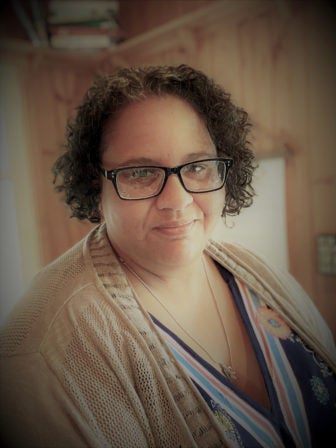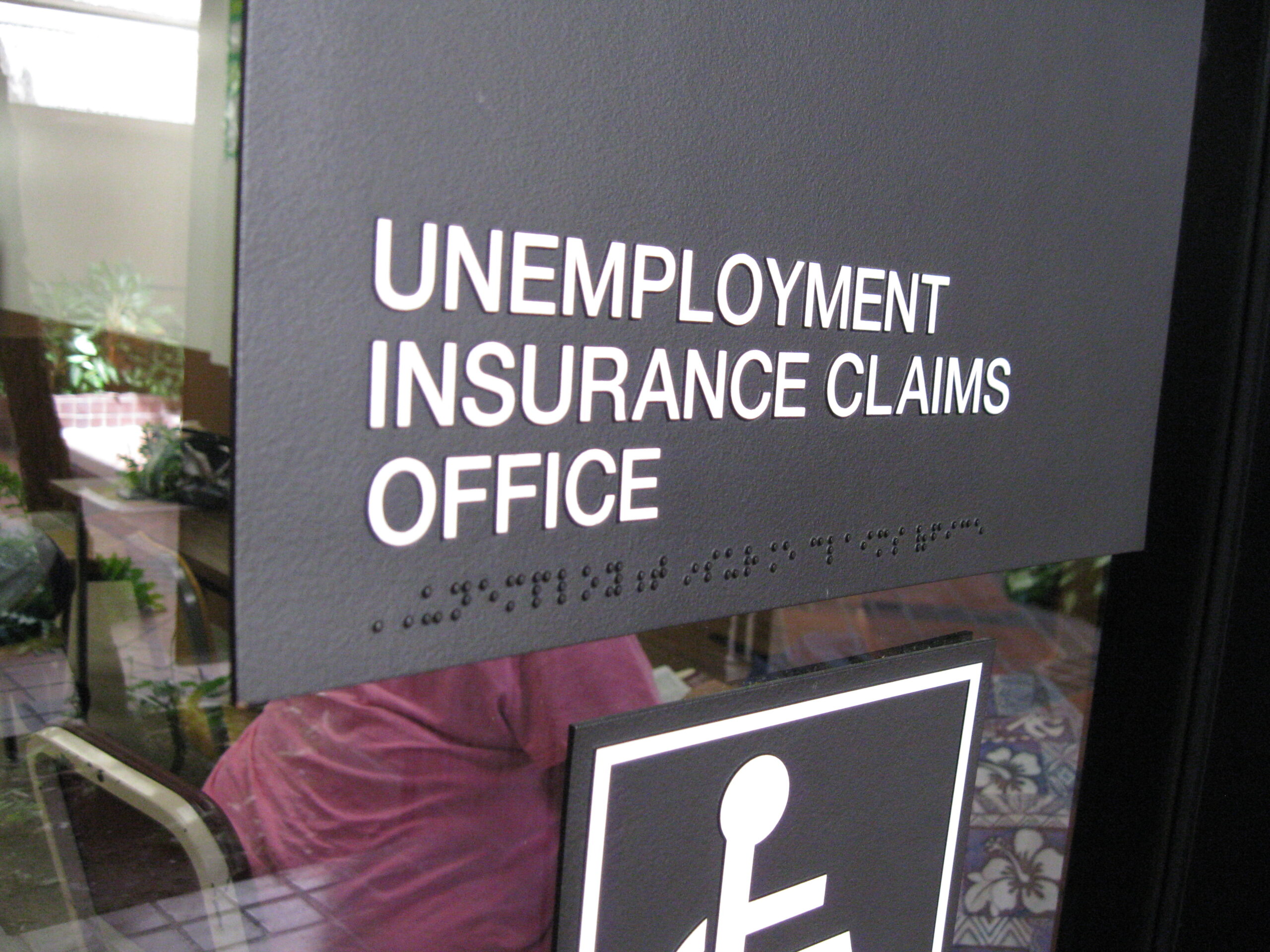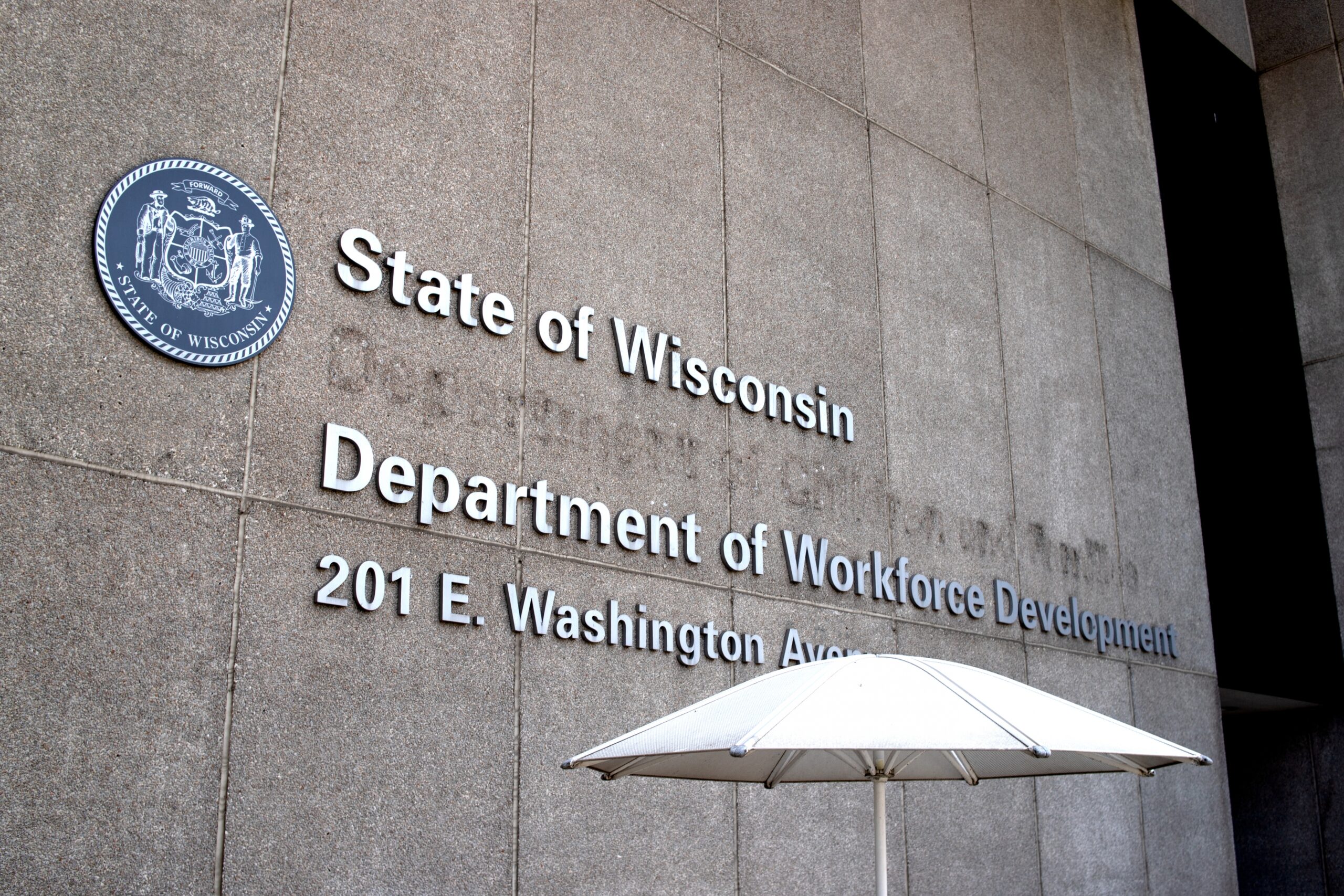When Fall River-based Robbins Manufacturing laid off David Ficke on March 29, the welder followed in the footsteps of hundreds of thousands of Wisconsinites during the coronavirus pandemic. He filed an initial unemployment claim, hoping it would help him survive a shutdown of much of the state’s economy.
But when an early morning call to the state’s unemployment helpline placed him in a queue of 400 to 500 people, Ficke knew he would wait a long time for aid as Wisconsin’s first come, first served system drowned in a flood of claims.
Unable to pay rent at his apartment in Beaver Dam, he moved into the “Hotel Chrysler” — his 2006 Town and Country Touring Edition minivan. Ficke drove west to a rest stop outside of Albert Lea, Minnesota. He wanted to be near his 3-year-old daughter who was living with his ex-wife and her family.
News with a little more humanity
WPR’s “Wisconsin Today” newsletter keeps you connected to the state you love without feeling overwhelmed. No paywall. No agenda. No corporate filter.
The family soon discovered Ficke was living in his van and insisted that he stay with them. That is how he ended up living with his ex-wife, her parents and her new boyfriend.
“It is what it is,” Ficke, 42, said in a video interview over Facebook Messenger. Ficke could not speak over his cell phone; he lost service for lack of payment during his nearly three-month wait for jobless benefits. But he’s trying to stay positive.

“We’re all here for our little baby,” he said of his daughter.
Half A Million Claims Pending
The Wisconsin Department of Workforce Development (DWD) has paid about 2.5 million of more than 3.4 million weekly unemployment claims it received between March 15 and June 20. The agency has denied 409,000 claims and has yet to process 509,000 others, the latter of which represents about 151,000 people.
The agency added hundreds of new and reassigned workers during the pandemic to staff phone lines and process and adjudicate backlogged claims. DWD Secretary Caleb Frostman said in a June 17 interview that his agency was “very, very close” to resolving outstanding claims from March, the earliest days of the pandemic, and the agency is prioritizing adjudicated claims in the order they were received.
Frostman blames the slow pace on a chronically underfunded and outdated computer system and initial short staffing that left his agency ill-equipped to handle the rapid onslaught of claims. Republican lawmakers accuse Frostman and Democratic Gov. Tony Evers for lacking urgency — waiting too long to expand call center hours and shift employees to address the biggest problems.
Not up for debate: that Wisconsin’s unemployment insurance system has failed to deliver for thousands of residents at a time when they most need it, leaving many to miss bill payments, rack up new credit card debt, lean on food pantries and face eviction — even homelessness.
The state’s tangled unemployment safety net has failed in a variety of ways to catch its residents, interviews with 16 laid-off workers show. Their stories highlight the difficulties of navigating the state’s unemployment system under any circumstances — let alone during a global pandemic.
Wisconsin’s unemployment insurance woes are part of a national trend, according to experts and media reports.
Pennsylvania as of mid-June still had yet to process 15 percent of claims filed in March. In Florida, which has received 2.3 million “unique” jobless applications, one applicant needing to provide information reported calling an assistance line as many as 400 times without getting through. Unemployment insurance applicants in Kentucky have waited outside of state offices for hours to resolve claims issues in person. Washington state called in the National Guard to address its claims backlog. The interim director of Nevada’s unemployment insurance system resigned from her post after the governor reported “threats to her personal safety” from frustrated claimants.
The pandemic struck after a years-long push in Wisconsin and other states to make accessing jobless benefits harder.
Just 32 percent of unemployed Wisconsin workers accessed benefits in 2016, down from 50 percent in 2007, according to a 2017 study by the National Employment Law Project, a nonprofit that supports protections for low-wage workers and the unemployed. Nationally, the rate of covered unemployed workers fell from 36 percent to 27 percent over the same period.
“Systems have been over-calibrated to prevent overpayments at the expense of paying appropriate benefits. States have programmed their computer systems to pause applications at every decision point, which can generate multiple eligibility determinations and denials,” Michele Evermore, senior policy analyst with the unemployment law group, testified this month to the U.S. Senate Committee on Finance.
“As we have seen, that is going to slow down benefits getting to the public when there is a crisis,” Evermore said.
‘Not Sure’ Leads To Long Wait
Ficke’s wait for help concerns how he lost a previous welding job at Karavan Trailers in Fox Lake in 2018. Wisconsin requires unemployment insurance applicants to have worked within the past 18 months and earned enough wages. Applicants must detail that job history.
Ficke is not sure whether Karavan fired or laid him off, but his exit came as the company cut more than 50 employees at once, he recalled. The exit was not traumatic when it happened, since Ficke had already started working part time at Robbins with prospects to add more hours.
Asked on his unemployment insurance application to explain why he left Karavan, Ficke checked a box signaling he was unsure. That sent his application into an abyss of claims needing adjudication — and it required reaching an elusive DWD staffer over the phone.
“I understand waiting four or five weeks. I get it, I do,” Ficke said. “But when you’re out eight, nine,10, 11 weeks, you have to be able to do something for the people.”
He added: “We need to hold people accountable.”
Problems not new
Ficke is among many who complain of getting kicked off overwhelmed DWD phone lines while trying to resolve claims issues. The pandemic made the problem more visible, but the issue is not new.
A 2014 state audit found that DWD call centers automatically blocked 80 percent of calls during times of high volume.
“It can be challenging for DWD to handle significant, temporary increases in calls during certain times of the year. If the steps that DWD has planned are insufficient and large numbers of calls are blocked in the coming months, DWD may need to take additional action,” the audit said.
The audit came as Wisconsin’s Republican-controlled Legislature largely focused on limiting access to unemployment insurance and reducing perceived fraud.
Beginning in 2011, the Legislature under then-Gov. Scott Walker, a Republican, enacted a series of laws that: created a one-week waiting period for benefits (temporarily waived during the pandemic), increased work search requirements for recipients, disqualified people on federal disability from accessing unemployment compensation and increased criminal penalties for making false statements or representations on applications.
Additionally, Walker signed a lame-duck law just before Evers took office that restricts the governor’s ability to waive certain requirements for state-federal benefits programs including unemployment insurance. And Wisconsin’s $370 a week maximum benefit is among the most miserly in the United States, ranking 40th among the states and the District of Columbia. (Through the $2 trillion CARES Act stimulus, the federal government is adding $600 to each check through July 31.)
Unemployment applicants as of June 23 spent an average of 19 days waiting for their claims to be paid, according to DWD. But people in Ficke’s shoes are waiting much longer as the agency investigates and adjudicates issues its system flags as problematic.
In May the agency announced it had contracted the firm Nelnet to provide at least 200 people to process and adjudicate claims. The agency later said Nelnet would ramp up to 300 such workers by the end of June. DWD contracted two additional vendors to add hundreds of new staff to overwhelmed phone lines. The agency received 439,000-plus unemployment insurance calls the week of June 20 alone.
All told, Frostman said the agency will be adding about 1,300 new staffers to handle the surge of claims and calls, up from 504 total unemployment insurance staff in March. But 20,000-plus people continue to file initial claims every week, only adding to the adjudication line. Many laid off workers can’t afford to wait any longer for help.

That includes Chenon Times-Rainwater, a 41-year-old life coach and small business owner in West Bend. She waited more than two months for her claim. It was resolved June 26, but she said the agency did not calculate her benefits correctly. Times-Rainwater made the difficult decision during the pandemic to place her 16-year-old daughter with special needs in a group home when her family could no longer pay for caregivers to come to their house.
“We can’t afford to pay her staff without income.”
Times-Rainwater helps organize Wisconsin Unemployment Support Group, a Facebook gathering to trade tips and moral support for folks battling DWD bureaucracy. The group has swelled to about 4,000 members during the pandemic. In her leadership role, Times-Rainwater said she has helped relocate 14 families that have lost their homes after losing jobs and lacking state aid.
Her group wants Evers to fire Frostman and Mark Reihl, DWD’s unemployment insurance administrator.
“The incompetence and unwillingness to coordinate with other states, seek appropriate guidance, acknowledge defeat, and accept any responsibility for the ultimate failure of the DWD’s response the Covid Relief efforts are astounding,” the group said in a press release Thursday
“Sixteen weeks people have gone without income,” Times-Rainwater said in an interview, “and nobody cares.”
Wisconsin Slow To Distribute Federal Aid
Wisconsin is also distributing unemployment benefits under a separate federal program: Pandemic Unemployment Assistance (PUA). Congress created the program for people who lost their jobs because of the pandemic but “would not qualify for regular unemployment compensation.”
Congress channeled PUA funds through state unemployment insurance agencies, and Wisconsin has struggled to allocate the money to folks who need it. That includes Adriana Patino, 44, of Marshall in Dane County.
The single mother, who asked to be identified by her maiden name, earns a living transcribing and captioning off-line videos such as university lectures and work training — work that began drying up in April.

PUA was designed specifically to reach people like her; as an independent contractor, she does not qualify for traditional unemployment aid. But Patino said DWD took two months to even allow her to apply for PUA, leaving her without income and falling behind on rent and car payments. DWD eventually expedited the denial — but only after tragedy struck.
Patino previously worked for a company called CRV Holdings. She left on good terms last year to pivot to freelancing — giving her more time to care for her 5-year-old daughter. DWD doesn’t allow people to apply for PUA until the agency denies them regular benefits.
Patino’s case is not complicated in that regard; leaving a job voluntarily, even on good terms, is enough to prompt a Wisconsin claim denial. But she waited two months for DWD to deny her regular claim.
While still waiting for a denial, Patino learned that her eldest daughter died in Texas, and she had no money to travel to the memorial service, which has since been delayed to avoid spreading COVID-19. The same day she heard the terrible news, Evers’ office replied to one of her earlier emails seeking help. Patino sent a fiery follow up.
“I ripped into them,” she said. “Life is unpredictable, but to assume everyone can wait (for unemployment benefits) is a guarantee that a small percentage of those folks will be affected tremendously.”
An adjudicator called the next day with news: DWD had finally denied the regular claim. That sent Patino into a new queue of people waiting on the agency to process their PUA claims.
“What’s scary is that some of the PUA questions leave room for the adjudicator to make an assessment that could go another way if it were someone else. Mine were both very kind, but when they use terms like ‘fair enough’ — and your livelihood is hanging in the balance — it is unnerving,” Patino said.
Money finally showed up in Patino’s bank account on June 22.
“It’s just a testament to how slow the process still is, even when they do try to expedite a request from the governor’s office because of circumstances like mine,” Patino said.
Wisconsin accepted more than 75,000 PUA claims through June 20. Congress created PUA in late March, and the U.S. Department of Labor issued administration guidance to states on April 5. But Wisconsin did not begin accepting claims until April 21, and DWD took another month to issue determinations and payments.
Frostman, the workforce secretary, said his agency needed time to interpret federal guidance for the new program. By April 27, for example, state agencies nationwide asked enough questions to prompt the labor department to update its guidance. Another obstacle Frostman cited: DWD’s 1970s-era technology, a vulnerability that lawmakers and regulators have understood for decades but never bothered to fix.
DWD planned a major overhaul of its computer system more than a decade ago, but Democratic Gov. Jim Doyle’s administration pulled the plug in 2007 as the project — contracted to two outside companies — fell behind schedule and looked poised to exceed its $24 million budget.
The agency’s IT system requires sequential testing and programming, Frostman said, meaning new benefits programs must be added to the system one at a time. That meant DWD could not program PUA rules until it finished handling other changes required by Congress and the Wisconsin Legislature. Those include the federal government’s temporary $600 weekly increase in benefits and the state’s waiver of a one-week waiting period for benefits.
The agency began accepting applications on June 24 for benefits under another federal program: Pandemic Emergency Unemployment Compensation, which adds 13 weeks of aid for people who have exhausted regular benefits.
Frostman said he understands frustration with his agency, adding that its efforts are “starting to bear fruit” in processing claims more quickly.
“If they’re found eligible and making their weekly claims, they’ll get every dollar they’re entitled to including back pay,” Frostman said.
Still, he acknowledged, back payments would not fix every hardship of living months without income.
Returning To Work, But Not To Normal
The pandemic is far from over, but businesses are reopening, leaving some Wisconsinites returning to old jobs or searching for new ones.
While waiting for his claim to be adjudicated, Chris Acree learned that he is going to be a father. The Fox Valley Mall Burger King he manages in Appleton reopened in June. That will offer a financial boost, but the 33-year-old remains behind on his rent and car payments.

April Lamm, a 41-year-old single mom in Beloit, tapped her tax refund and federal stimulus check to pay bills in April and May. As she waits for her claim, she is looking for work she can do from home while watching her 7-year-old son. But most remote work requires a computer, something Lamm does not own.
Lori Yach, 48, said the bartending job she landed in November at Ho-Chunk Gaming in Nekoosa finally allowed her to live comfortably while paying down the fines she accumulated during years of struggling with addiction. Out of work since late March, Yach is aiming to bolster her resume by taking a free class through Portage County to become certified as an office assistant. She applied for food stamps while waiting on her PUA claim. [[{“fid”:”1290286″,”view_mode”:”embed_portrait”,”fields”:{“format”:”embed_portrait”,”alignment”:”right”,”field_image_caption[und][0][value]”:”%3Cp%3EOut%20of%20work%20since%20late%20March%2C%20Lori%20Yach%20is%20aiming%20to%20bolster%20her%20resume%20by%20taking%20a%20free%20class%20through%20Portage%20County%20to%20become%20certified%20as%20an%20office%20assistant.%20She%20applied%20for%20food%20stamps%20while%20waiting%20on%20her%20claim%20for%20federal%20pandemic%20assistance.%20%3Cem%3ECourtesy%20of%20Lori%20Yach%3C%2Fem%3E%3C%2Fp%3E%0A”,”field_image_caption[und][0][format]”:”full_html”,”field_file_image_alt_text[und][0][value]”:”Lori Yach”,”field_file_image_title_text[und][0][value]”:”Lori Yach”},”type”:”media”,”field_deltas”:{“6”:{“format”:”embed_portrait”,”alignment”:”right”,”field_image_caption[und][0][value]”:”%3Cp%3EOut%20of%20work%20since%20late%20March%2C%20Lori%20Yach%20is%20aiming%20to%20bolster%20her%20resume%20by%20taking%20a%20free%20class%20through%20Portage%20County%20to%20become%20certified%20as%20an%20office%20assistant.%20She%20applied%20for%20food%20stamps%20while%20waiting%20on%20her%20claim%20for%20federal%20pandemic%20assistance.%20%3Cem%3ECourtesy%20of%20Lori%20Yach%3C%2Fem%3E%3C%2Fp%3E%0A”,”field_image_caption[und][0][format]”:”full_html”,”field_file_image_alt_text[und][0][value]”:”Lori Yach”,”field_file_image_title_text[und][0][value]”:”Lori Yach”}},”link_text”:false,”attributes”:{“alt”:”Lori Yach”,”title”:”Lori Yach”,”class”:”media-element file-embed-portrait media-wysiwyg-align-right”,”data-delta”:”6″}}]]
Antonette Matis has returned to work as a dispatcher for Washington County’s subsidized shared-ride taxi service, but at reduced hours. The 58-year-old, who has limited mobility since breaking her neck in 1975, worries she will lose her car and apartment if DWD does not reverse its ban on federal disability recipients receiving PUA aid.
Jessica Barrera, a single mom in Eau Claire on federal disability, joins Matis in hoping DWD will grant federal pandemic aid to folks like her. After losing her airport shuttle company job in March, Barrera this month began working weekends at Menards. But retroactive benefits would help her fix a credit score that plunged when she maxed out her credit card to keep her apartment.
In Marshall, Patino said her freelance work is starting to pick back up. In West Bend, Times-Rainwater is advocating for laid-off workers full-time.
Ficke, the welder, guessed he has applied to 20 to 25 jobs during the pandemic. He’s praying that Robbins Manufacturing, a small family-run company, will hire him back.
“The owner knows your name. He knows your kid’s name,” Ficke said. “You’re not just a number. You’re not just another robot to crank out as much as you can.”
This story comes from a partnership of Wisconsin Watch and WPR. Bram Sable-Smith is WPR’s Mike Simonson Memorial Investigative Fellow embedded in the newsroom of Wisconsin Watch (wisconsinwatch.org), which collaborates with WPR, PBS Wisconsin, other news media and the University of Wisconsin-Madison School of Journalism and Mass Communication. All works created, published, posted or disseminated by Wisconsin Watch do not necessarily reflect the views or opinions of UW-Madison or any of its affiliates.





